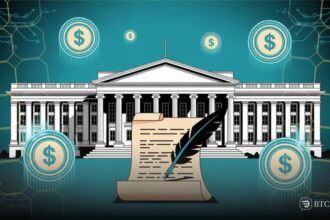The U.S. Treasury Department has recently finalized rules mandating that crypto brokers report transactions involving crypto assets to the IRS, signaling a notable change in how crypto taxes will be handled.
The Treasury and IRS jointly introduced new regulations on June 28 to enforce sections of the bipartisan Infrastructure Investment and Jobs Act. Brokers must disclose total proceeds from crypto sales in 2025, initiating in 2026. Additionally, by 2027, they will be required to furnish tax basis details for specific assets sold in 2026.
The decision aims to simplify tax filing for individuals investing in crypto and address potential tax avoidance. Despite the existing obligation for holders to pay taxes on transactions, many previously turned to expensive external services for profit and loss calculations. The new rules are expected to streamline and reduce the cost of this process.
Treasury officials finalized these rules after analyzing more than 44,000 public opinions and conducting a hearing. Currently affecting custodial brokers, the regulations are expected to expand to non-custodial brokers later this year.
Impact on custodial vs. non-custodial crypto brokers
Meanwhile, Crypto researcher Peter Van Valkenburgh highlighted a positive factor in the announcement, stating in an X post that the final regulations specifically target custodial brokers, a move he considered safe. Nevertheless, he expressed concerns regarding the potential implications on freedom of speech for non-custodial entities in future regulatory frameworks.
Van Valkenburgh argued:
For non-custodial entities, however, forcing developers to build different software tools than they otherwise would have built, which collect private information that they otherwise never would have sought to collect, absolutely does impact protected speech and association.
Nonetheless, these new rules bring the crypto industry closer to traditional financial services, potentially moving wider adoption and offering regulatory transparency.
Related | 21Shares applies for Solana spot ETF







